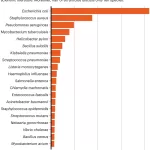A groundbreaking study led by Australian researchers has revealed that a commonly prescribed antibiotic may be driving the rise of a near-untreatable superbug, raising concerns about the global fight against antimicrobial resistance (AMR). The study, published on Thursday, was conducted by the University of Melbourne, the Peter Doherty Institute for Infection and Immunity, and Austin Health, with significant international collaboration.
The researchers have linked the antibiotic rifaximin, often prescribed to patients with liver disease, to the emergence of a dangerous strain of the superbug vancomycin-resistant Enterococcus faecium (VRE). This bacterial infection, which is highly contagious, can lead to severe complications, especially in hospitalized patients.
Superbugs, a term used for bacteria, viruses, fungi, and parasites that have developed resistance to standard antibiotic treatments, are a growing global threat. The World Health Organization (WHO) has identified AMR as one of the most pressing public health issues of our time, contributing to nearly 4.95 million deaths globally in 2019.
The eight-year study revealed that rifaximin has triggered genetic changes in VRE, making it resistant to daptomycin, one of the few last-resort antibiotics available for treating multi-drug-resistant pathogens. This finding challenges the long-held belief that rifaximin posed minimal risk in contributing to AMR.
“We’ve shown that rifaximin makes VRE resistant to daptomycin in a way that has not been seen before,” said Glen Carter, senior author of the study from the University of Melbourne and the Doherty Institute. “It is also of concern that these daptomycin-resistant VRE might be transmitted to other patients in the hospital; a hypothesis that we are presently investigating.”
This discovery underscores the urgent need for enhanced genomic-based surveillance systems to track emerging AMR threats. Effective monitoring could help detect the development of such dangerous superbugs early and inform more targeted interventions.
The research adds to growing concerns about the overuse and misuse of antibiotics in both human and veterinary medicine. As superbugs continue to evolve and render existing treatments ineffective, global health systems are under increasing pressure to find alternative solutions, improve diagnostic methods, and promote responsible antibiotic use.
The findings serve as a crucial reminder of the ongoing battle against antimicrobial resistance and the need for collaborative efforts in research, healthcare policy, and public awareness to curb this global health crisis.









